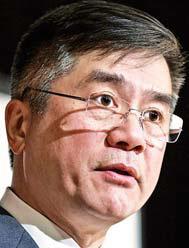WASHINGTON - The United States will try to boost exports to China - rather than limit imports from the country - to reduce its huge trade deficit, US Secretary of Commerce Gary Locke has said.

Gary Locke, US secretary of commerce, is expected to lead a trade mission to China in May.
Locke will lead a trade mission to China from May 15 to 21, ahead of the second US-China Strategic and Economic Dialogue (SAED) scheduled for May 23.The mission will be "focusing on promoting US exports for a broad range of new energy technologies, including clean energy, energy efficiency, and electricity transmission, distribution and storage," Locke told China Daily in an email interview.
"China is our second-largest trading partner, our largest source of imports and the largest export market for American goods outside of North America.
"We believe increasing our exports to China - not limiting our imports from China - is the best way to address the trade deficit," he said. "To accomplish this goal, we are actively promoting the export of American goods and services."
Locke's remarks come among rising trade tensions between the two countries, which have announced anti-dumping tariffs on some of each other's products over the past weeks.
Beijing announced last Wednesday that it would slap anti-subsidy duties of up to 31 percent on chicken products from the US after the US Commerce Department initiated an anti-subsidy and anti-dumping investigation into Chinese aluminum extrusion manufacturers.
Beijing is also under mounting pressure from Washington to let its currency appreciate as many politicians and economists in the US say the value of the yuan is kept artificially low against the dollar, which they contend is a key reason behind the huge US trade deficit with China.
China refutes the claim, saying US restrictions on exports of high-tech products are the root cause of the deficit.
According to US foreign trade statistics, the trade deficit with China reached $227 billion last year, compared with the record $268 billion in 2008, the largest between any two countries. Total bilateral trade volume hit $366 billion in 2009.
Zhou Shijian, a senior fellow at the Center for US-China Relations affiliated to Tsinghua University, agrees with Locke's game plan but added "the problem is what the US can sell to China".
The United States considers it a "very sensitive" issue when China seeks more imports of high-tech products, as they are often referred to as dual-use technologies that can be applied in both military and civilian fields.
"But the US can export more high-tech products for civilian use such as environmental protection and green energy products," which China is in dire need of, Zhou said.
An increase in the exports of such products will help create job opportunities in the US, where the jobless rate hit 9.7 percent in March.
In 2007, China signed an agreement with US-based Westinghouse, under which it will use the company's AP1000 technology to build two nuclear power plants. The $8-billion agreement, the first large-scale joint venture nuclear project, created more than 5,500 jobs in the US.
On Google's recent move to exit from the Chinese mainland market, Locke said "this is a business decision" by the company.
But he said the US is concerned "about China's increasing use of industrial policies that may restrict market access and discriminate against foreign goods and services".
Some foreign companies in China say those policies favor domestic businesses, but some Chinese companies have long complained that the government offers too many preferential policies to foreign firms.
Premier Wen Jiabao reassured foreign companies last week that they will not face discrimination in the country as the government will "unswervingly" continue its opening up drive that will facilitate foreign investment.
"The policy of encouraging indigenous innovation treats all businesses in China the same. It will not exclude foreign companies," Wen said when he met some European business people who have enterprises in China.
Locke also expressed hope for a more open market in China.
"China recently issued new policy guidelines that may provide more openness and lower market access thresholds to foreign investment in certain sectors. We look forward to more details."
Zhang Haizhou in Beijing contributed to this story.





